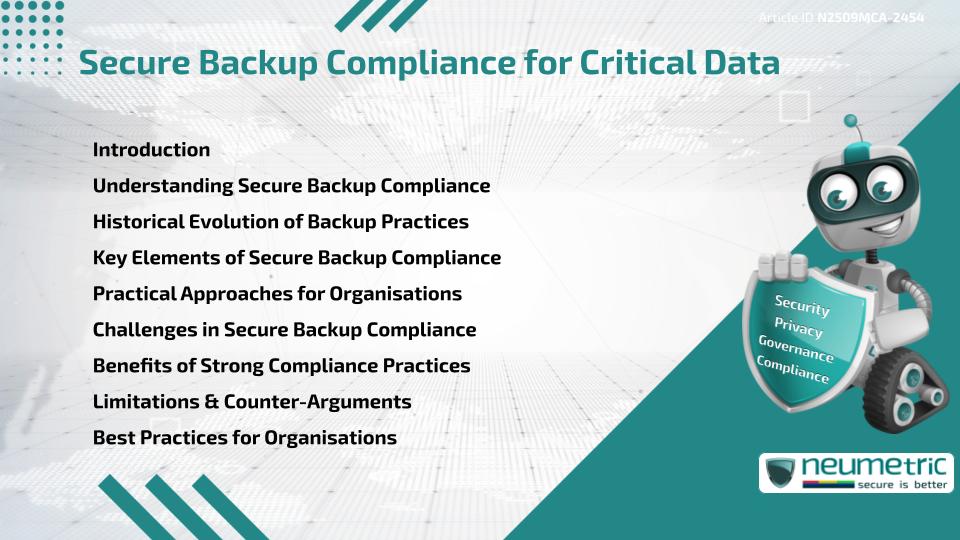Table of Contents
ToggleIntroduction
Secure Backup Compliance ensures that organisations protect & manage their critical Data Backups in line with Industry Standards, Regulations & Best Practices. It focuses on keeping backups safe from loss, corruption or unauthorised access, while also ensuring recoverability during crises. Without Compliance, backups may exist but fail to deliver reliable protection when needed most.
This article explains the concept, history, challenges, benefits & Best Practices of Secure Backup Compliance. It shows why Compliance is vital for safeguarding critical data & maintaining trust.
Understanding Secure Backup Compliance
Secure Backup Compliance is more than just storing copies of data. It is about aligning backup Policies & Practices with Legal, Regulatory & Security frameworks. For example, regulations like GDPR & HIPAA require organisations to protect Sensitive Data even in backup form.
A useful analogy is having a fire escape plan. Owning an emergency exit is not enough-it must be functional, accessible & compliant with safety standards. Similarly, backups must be secure, reliable & compliant to provide true protection.
Historical Evolution of Backup Practices
In the past, backups were primarily physical, stored on tapes or disks kept in offsite facilities. While effective for basic recovery, they often lacked strong Security Controls.
With the rise of digital transformation in the 2000s, backups became more complex, spanning cloud platforms, hybrid systems & virtual environments. Regulatory frameworks soon evolved, recognising the need to protect data not just in primary systems but also in backup repositories. Today, Secure Backup Compliance is an essential requirement across all industries.
Key Elements of Secure Backup Compliance
Effective Secure Backup Compliance requires attention to:
- Data Confidentiality: Backups must be Encrypted both in transit & at rest.
- Integrity Controls: Checksums & validation processes ensure backups remain unaltered.
- Retention Policies: Clear rules define how long backups are stored.
- Access Restrictions: Only authorised personnel should handle backup data.
- Testing & Validation: Regular drills confirm that backups can be restored successfully.
Practical Approaches for Organisations
Organisations can adopt practical measures to ensure Compliance:
- Implementing automated Backup & Encryption solutions.
- Establishing multi-location backups for redundancy.
- Regularly Auditing Backup procedures against standards.
- Training staff on proper handling of Sensitive Data in backups.
- Partnering with Cloud Providers that offer Compliance-ready backup solutions.
Challenges in Secure Backup Compliance
Despite its importance, organisations face challenges such as:
- Complex Regulations: Navigating overlapping rules across regions.
- Cost Constraints: Investing in Secure Backup infrastructure can be expensive.
- Operational Risks: Human error may result in incomplete or unverified backups.
- Evolving Threats: Ransomware now targets backups, making them critical security assets.
These challenges highlight the need for ongoing investment & Governance in backup processes.
Benefits of Strong Compliance Practices
When organisations achieve Secure Backup Compliance, they gain:
- Resilience: Reliable recovery during outages or attacks.
- Regulatory Alignment: Avoidance of penalties & legal disputes.
- Customer Trust: Demonstrating responsibility strengthens credibility.
- Operational Continuity: Reduced downtime & Financial loss during Incidents.
Limitations & Counter-Arguments
Some argue that Compliance frameworks are too rigid, potentially limiting innovation in backup strategies. Others point out that meeting Compliance does not always guarantee actual recoverability if backups are not tested.
These critiques underscore the need for organisations to go beyond Compliance & focus equally on practical effectiveness.
Best Practices for Organisations
To strengthen Secure Backup Compliance, organisations should:
- Encrypt all Backups & enforce strict Access Controls.
- Establish Retention & Destruction Policies aligned with regulations.
- Conduct frequent restoration tests to verify reliability.
- Document processes for Transparency & Audit readiness.
- Integrate backup Compliance into broader Cybersecurity programs.
Takeaways
- Secure Backup Compliance protects critical data from loss or breaches.
- Encryption, Retention & Testing are essential elements.
- Organisations face challenges but gain resilience & trust through Compliance.
- Compliance alone is not enough-practical testing is vital.
- Best Practices transform Compliance into a strategic safeguard.
FAQ
What is Secure Backup Compliance?
It is the alignment of backup processes with Regulatory, Security & Industry Standards to protect critical data.
Why is Compliance important for backups?
It ensures backups remain secure, accessible & reliable during emergencies, while meeting legal requirements.
What are the key elements of Secure Backup Compliance?
Encryption, Integrity checks, Retention Policies, restricted access & regular testing are the main elements.
What challenges do organisations face in achieving Compliance?
Challenges include high costs, complex regulations, human error & evolving Threats like ransomware.
Does Compliance guarantee backup reliability?
No, Compliance sets standards but backups must be tested regularly to ensure reliability.
How do regulations affect backup Compliance?
Laws such as GDPR & HIPAA require Data Protection across both primary systems & backup copies.
How can small organisations achieve Secure Backup Compliance?
They can use affordable cloud-based backup solutions with built-in Compliance features & automated Security Controls.
Need help for Security, Privacy, Governance & VAPT?
Neumetric provides organisations the necessary help to achieve their Cybersecurity, Compliance, Governance, Privacy, Certifications & Pentesting needs.
Organisations & Businesses, specifically those which provide SaaS & AI Solutions in the Fintech, BFSI & other regulated sectors, usually need a Cybersecurity Partner for meeting & maintaining the ongoing Security & Privacy needs & requirements of their Enterprise Clients & Privacy conscious Customers.
SOC 2, ISO 27001, ISO 42001, NIST, HIPAA, HECVAT, EU GDPR are some of the Frameworks that are served by Fusion – a SaaS, multimodular, multitenant, centralised, automated, Cybersecurity & Compliance Management system.
Neumetric also provides Expert Services for technical security which covers VAPT for Web Applications, APIs, iOS & Android Mobile Apps, Security Testing for AWS & other Cloud Environments & Cloud Infrastructure & other similar scopes.
Reach out to us by Email or filling out the Contact Form…


